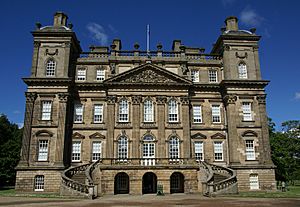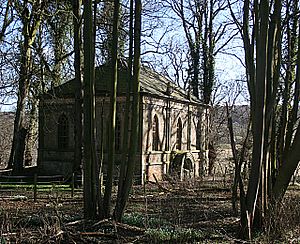Duff House facts for kids
 |
|
| Location | Banff, Aberdeenshire, Scotland |
|---|---|
|
Listed Building – Category A
|
|
| Official name | Duff House |
| Designated | 22 February 1972 |
| Reference no. | LB21985 |
|
Listed Building – Category A
|
|
| Official name | Duff House, Mausoleum |
| Designated | 22 February 1972 |
| Reference no. | LB21988 |
|
Listed Building – Category A
|
|
| Official name | Duff House, Fishing Temple |
| Designated | 04 March 1994 |
| Reference no. | LB2885 |
|
Listed Building – Category B
|
|
| Official name | Duff House, Walled Garden |
| Designated | 15 March 1995 |
| Reference no. | LB21989 |
|
Listed Building – Category B
|
|
| Official name | Duff House, Fife Gates |
| Designated | 15 March 1995 |
| Reference no. | LB21986 |
Duff House is a beautiful old country house in Banff, Scotland. It was built in the Georgian style, which was popular a long time ago. Today, Historic Environment Scotland looks after it. It is also part of the National Galleries Scotland. This means it is a very important building, known as a Category A listed building.
The house is made from large, smooth stone blocks called ashlar. It has three floors and is shaped like a big square. It also has tall towers at each corner. Duff House is part of a group of important buildings. This group includes the Fife gates, a walled garden, a mausoleum, and an ice house.
Contents
History of Duff House
Duff House was designed by a famous architect named William Adam. Construction started on June 11, 1735. It was built for William Duff of Braco. The original plan was for the house to be even bigger. It was meant to have extra buildings on the sides, connected by curved walkways. However, the Earl thought the house would be too large. This led to some disagreements between the architect and the Earl.
Changes and New Uses
Later, another architect, David Bryce Jr, added a three-story section. Sadly, this part was damaged by a bomb in 1940 and later removed. The family who owned Duff House, the Earls of Fife, moved out in 1903. They gave the property to Banff Burgh in 1906.
From 1911 to 1913, Duff House was a hotel. Then it became a special hospital called a sanatorium until 1923. After that, it was a hotel again for a few years. The hotel closed in 1928, and the house was not used much.
Duff House During Wartime
During the Second World War, Duff House had many different roles. First, it was used as a camp for people who were held there during the war. Later, it became a camp for prisoners of war. In 1940, the house was hit during a bombing raid. This caused serious damage to parts of the building. By 1942, the house became the main base for the Free Norwegian forces. It was also used by Polish exile forces.
Restoration and Modern Use
In 1956, the Scottish government took over the care of Duff House. A long period of repairs and improvements began. In 1995, the house became part of the National Galleries of Scotland. Today, Duff House is still surrounded by its original beautiful landscape. There is also a golf course nearby.
Art Collection at Duff House
The National Galleries of Scotland displays many amazing artworks at Duff House. You can see paintings by famous artists like El Greco, Thomas Gainsborough, and Henry Raeburn.
Duff House is also home to the Dunimarle Library. This is a special collection of rare and old books. If you are interested, you can arrange to view these books by making an appointment.
 | George Robert Carruthers |
 | Patricia Bath |
 | Jan Ernst Matzeliger |
 | Alexander Miles |


